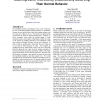215 search results - page 12 / 43 » Learning to Predict User Operations for Adaptive Scheduling |
IUI
2000
ACM
13 years 11 months ago
2000
ACM
For intelligent interfaces attempting to learn a user’s interests, the cost of obtaining labeled training instances is prohibitive because the user must directly label each trai...
WWW
2005
ACM
14 years 8 months ago
2005
ACM
Autonomics or self-reorganization becomes pertinent for websites serving a large number of users with highly varying workloads. An important component of self-adaptation is to mod...
CHI
2006
ACM
14 years 7 months ago
2006
ACM
As our business, academic, and personal lives continue to move at an ever-faster pace, finding times for busy people to meet has become an art. One of the most perplexing challeng...
JUCS
2006
13 years 7 months ago
2006
We outline the Berlin Brain-Computer Interface (BBCI), a system which enables us to translate brain signals from movements or movement intentions into control commands. The main co...
DSVIS
2003
Springer
14 years 18 days ago
2003
Springer
Adapting graphical user interface (GUI) to meet higher level of usability for users is one of the most interesting questions of today’s mobile computation. Users should have GUI ...

